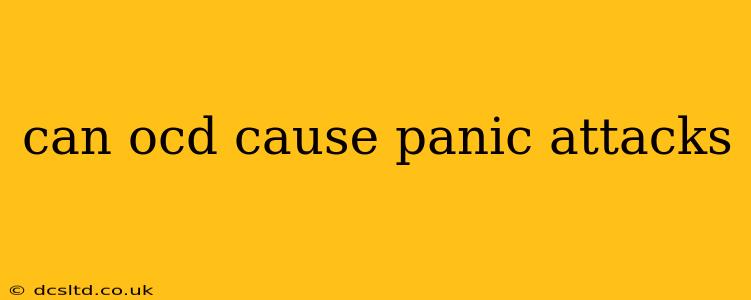Obsessive-compulsive disorder (OCD) and panic attacks often coexist, leading many to wonder about their relationship. While not directly causing panic attacks in the same way a heart condition might trigger a cardiac event, OCD can significantly increase the likelihood of experiencing them. This intricate connection stems from the shared neurological pathways and the nature of the conditions themselves. Let's delve deeper into this complex relationship.
What is OCD?
OCD is a mental health condition characterized by intrusive, unwanted thoughts (obsessions) that lead to repetitive behaviors or mental acts (compulsions). These compulsions are performed to reduce anxiety caused by the obsessions. The obsessions can revolve around a wide range of themes, including contamination, harm, order, symmetry, or religious concerns. The severity of obsessions and compulsions can vary greatly from person to person.
What are Panic Attacks?
Panic attacks are sudden episodes of intense fear or discomfort that peak within minutes. They're characterized by a range of physical and emotional symptoms, including rapid heartbeat, shortness of breath, sweating, trembling, chest pain, and a feeling of impending doom. The experience can be incredibly distressing and debilitating.
How are OCD and Panic Attacks Related?
The link between OCD and panic attacks is multifaceted:
-
Shared Neurological Pathways: Both OCD and panic disorder involve dysregulation in brain circuits related to fear and anxiety. Specific neurotransmitters, like serotonin, are implicated in both conditions. This shared neurobiological basis makes it more likely for someone with OCD to also experience panic attacks.
-
Anxiety Amplification: The constant worry and anxiety generated by OCD obsessions can create a fertile ground for panic attacks. The intense feelings of distress and uncertainty associated with OCD can easily escalate into a full-blown panic attack.
-
Compulsions as Avoidance: Compulsive behaviors often function as a way to avoid anxiety. However, this avoidance can ironically increase anxiety in the long run, potentially triggering panic attacks. The temporary relief provided by compulsions may be followed by a surge of anxiety as the individual anticipates the return of obsessive thoughts.
-
Stress and Triggers: Both OCD and panic attacks can be exacerbated by stress. Life stressors can intensify OCD symptoms, increasing the risk of panic attacks.
Can OCD Obsessions Directly Trigger Panic Attacks?
While not a direct cause-and-effect relationship, certain OCD obsessions can certainly trigger the physiological and emotional responses that lead to panic attacks. For example, an individual with contamination OCD might experience intense anxiety upon encountering a perceived contaminant, potentially escalating into a panic attack due to the overwhelming fear and bodily sensations.
Does everyone with OCD experience panic attacks?
No. While the co-occurrence is common, not everyone diagnosed with OCD will experience panic attacks. The severity of OCD, individual vulnerability to anxiety, and the presence of other mental health conditions all play a role.
How are OCD and Panic Attacks Treated?
Treatment often involves a combination of therapies and, sometimes, medication:
-
Cognitive Behavioral Therapy (CBT): CBT is a highly effective treatment for both OCD and panic disorder. It helps individuals identify and challenge negative thought patterns and develop coping mechanisms for managing anxiety. Exposure and response prevention (ERP) is a specific type of CBT particularly effective for OCD.
-
Medication: Selective serotonin reuptake inhibitors (SSRIs) are commonly prescribed for both OCD and panic disorder to help regulate serotonin levels in the brain. Other medications may be used depending on individual needs.
Can Panic Attacks worsen OCD Symptoms?
Yes, the experience of a panic attack can further worsen OCD symptoms. The intense anxiety and distress associated with a panic attack can reinforce obsessive thoughts and increase the likelihood of engaging in compulsive behaviors as a way to cope. This creates a cycle where panic attacks fuel OCD symptoms and vice versa.
Understanding the interplay between OCD and panic attacks is crucial for effective treatment. If you're struggling with either condition, seeking professional help from a mental health professional is essential. They can provide a proper diagnosis, develop a personalized treatment plan, and offer support throughout your journey to recovery.
